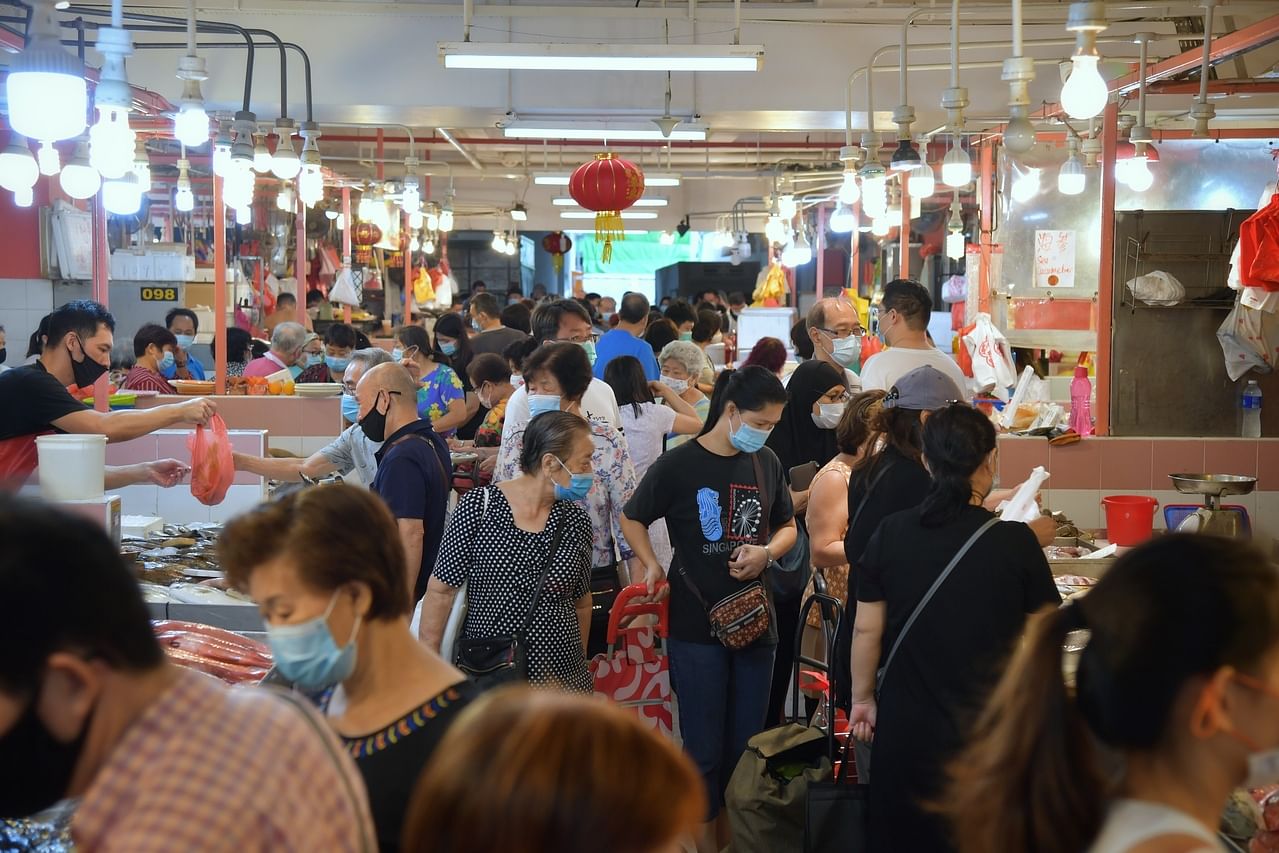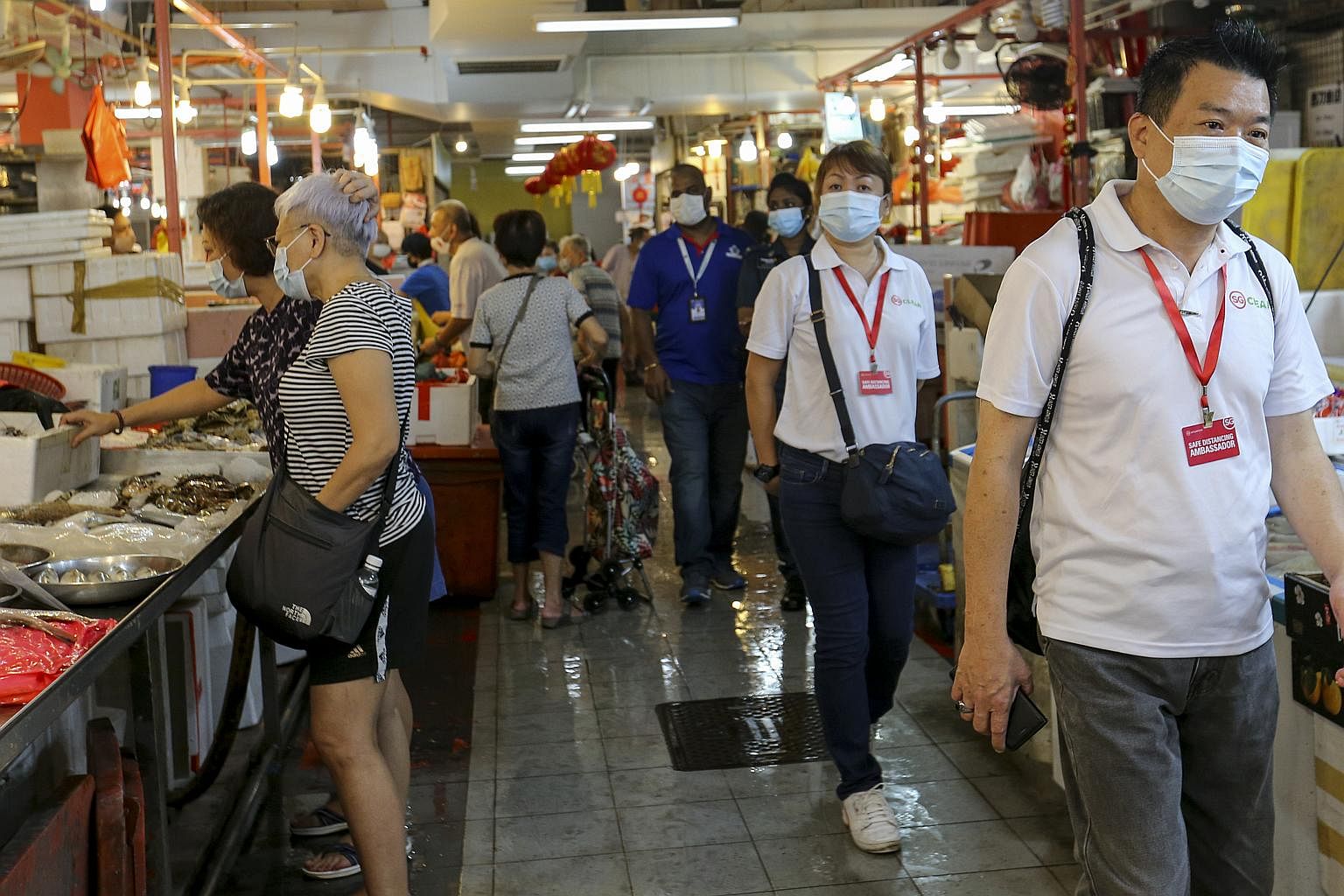Fewer visitors at Chinatown Complex wet market as experts remind shoppers of Covid-19 risk
Sign up now: Get ST's newsletters delivered to your inbox
Follow topic:
SINGAPORE - Shoppers seemed more mindful of safe management measures at the Chinatown Complex wet market on Wednesday (Feb 3) morning.
Queues continued to form at some popular stalls selling seafood and steamboat ingredients, but they were nowhere as long as those seen on Tuesday.
When The Straits Times visited the market on Tuesday, it was close to its allowable capacity of 300 people by noon. On Wednesday, the number of noontime visitors had halved, ST estimates.
Various entrances to the market were fenced up as part of access control and there were floor markings in the wet market reminding customers to stand 1m apart.
The National Environment Agency (NEA) has stepped up safe management measures over the past week as footfall at Chinatown Complex is expected to rise during the Chinese New Year period.
The flow of patrons into the market may be stopped even if the capacity limit of 300 people is not reached if localised crowding occurs at certain sections of the market, NEA said.
"NEA seeks the understanding of patrons that there may be queues and inconvenience at the market as more people make festive purchases during this period," the agency added.
A 77-year-old, who gave his name only as Mr Liang, was one of about 75 people in a quick-moving queue to enter the wet market at 11am.
"I did not expect the queues to be so long. But it's good we are maintaining a safe distance," he told ST.
The retiree was at the wet market to buy a week's stock of fish, fishcakes and fishballs for his family members, who are fond of the stalls there.
"There is a risk (in visiting the market). But I don't take off my mask. When I reach home, I immediately wash my hands before I touch anything else," Mr Liang said.
Another shopper, Madam Annie Cheong, 76, added: "We don't need to be scared. If there is a Covid-19 case, they will disinfect the whole place."

Shoppers throng the seafood section at Chinatown Wet Market on Feb 2, 2021.
ST PHOTO: NG SOR LUAN
Experts, however, weighed in on the risks of a Covid-19 cluster developing in the market.
"Although community transmission is low, there are sporadic cases, and we did see some cases late last year at another popular market, Tekka. So although the risk is low, it is not zero," said Associate Professor Alex Cook, vice-dean of research at the Saw Swee Hock School of Public Health at the National University of Singapore.
Professor Teo Yik Ying, who is dean at the same school, added that there is some additional risk at wet markets as shoppers communicate directly with the stallholders, and cash and food products change hands.
"Let us not forget that the very first location flagged for a known community spread was effectively a wet market in Wuhan," added Prof Teo.
He noted that crowds can increase the extent of spread, and also the speed of spread of Covid-19, leading to a higher risk of an accelerated outbreak in the community.
In an advisory issued to stallholders on Wednesday morning, NEA urged them to ensure customers maintain a safe distance of at least 1m from one another while queueing.
"Stallholders are strictly not allowed to cause obstruction by placing articles beyond the stipulated area at all times," it said.
While stallholders agreed that the safe management measures were necessary, some told ST they were concerned about a reduction in business after fewer people visited the market on Wednesday.

ST PHOTO: YONG LI XUAN
"When customers have to wait, they are upset. They won't want to queue," said a vegetable stall owner who wanted to be known only as Madam Qian.
"I don't know whether to bring in more vegetables if I cannot sell them," the 60-year-old added.
Fruit stall owner Soon Ah Eng said she had 20 per cent fewer customers on Wednesday compared with the day before.
But Ms Soon, who is in her 60s, added: "If people fall sick, the market will have to close. When there's no virus, then we will have more business."

